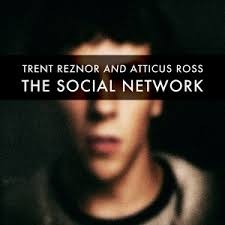You know their songs. You’ve probably screamed them in your car, cried to them in your bedroom, and danced to them at 2 a.m. But some of the world’s biggest music stars didn’t stop at topping the charts — they brought their talents to the big screen, too. Here are ten artists from the last 30 years who turned their sound into cinematic gold, scoring films and proving that great storytelling doesn’t always need words.
Trent Reznor & Atticus Ross (Nine Inch Nails)
The masterminds behind Nine Inch Nails traded distortion pedals for film reels—and ended up reinventing the modern film score. With The Social Network, Gone Girl, Watchmen, and Soul (yes, that Soul), Trent and Atticus crafted soundscapes that feel like anxiety with a pulse and beauty on the brink. Their music doesn’t just underscore a film—it rewires it. Cold, immersive, and emotionally surgical, their scores make you feel like you’re inside someone else’s thoughts.
Jonny Greenwood (Radiohead)
When he’s not reshaping rock with Radiohead, Jonny Greenwood is composing unnerving, orchestral scores that feel like emotional hurricanes. His work on There Will Be Blood, Phantom Thread, and The Power of the Dog is raw, cerebral, and uniquely Greenwood — strings that creep, swell, and haunt. He doesn’t just set a mood; he unearths one.
Hildur Guðnadóttir
Before she became the Oscar-winning composer of Joker, Hildur was touring and recording with experimental and post-rock outfits like Múm and Pan Sonic. Her background in avant-garde cello gives her film work an emotional gravity — just listen to Chernobyl or Tár. Her music isn’t background — it’s part of the character’s soul.
Mica Levi (Micachu and the Shapes)
Mica Levi came out of London’s underground pop scene with distorted guitars and deconstructed hooks — and then absolutely floored Hollywood. Their scores for Under the Skin, Jackie, and Zola are eerie, dissonant, and unlike anything you’ve heard in a multiplex. It’s art-house meets alien transmission, and somehow it works beautifully.
Jon Batiste
Best known as Stephen Colbert’s bandleader and a jazz/pop/soul powerhouse in his own right, Jon Batiste stepped into film scoring with Soul, winning an Oscar alongside Reznor and Ross. His vibrant, humanistic jazz contributions brought warmth, wonder, and a heartbeat to Pixar’s existential dreamscape. The piano’s never felt so alive.
Nick Cave & Warren Ellis
The brooding bard and his violinist partner-in-gloom took their signature intensity from The Bad Seeds and poured it into film. Their scores for The Assassination of Jesse James, The Road, and Hell or High Water are all atmosphere — windswept, ghostly, and full of aching beauty. It’s the kind of music that makes your bones feel things.
Mark Mothersbaugh (Devo)
Yes, the guy behind “Whip It” became one of the busiest film and TV composers of the 2000s. From The Royal Tenenbaums to Thor: Ragnarok and The Lego Movie, Mothersbaugh’s quirky, synthy, offbeat sensibilities bring heart and humor to anything he touches. The secret? He still thinks like a punk, even when he’s scoring superheroes.
Danny Elfman (Oingo Boingo)
Okay, he started before the last 30 years — but let’s be honest, most of your favorite movie scores have Danny Elfman’s DNA in them. The former Oingo Boingo frontman has soundtracked everything from Edward Scissorhands to Spider-Man to Doctor Strange. His style is whimsical, gothic, and unmistakably Elfman — part circus, part nightmare, all magic.
Thom Yorke (Radiohead)
While Greenwood grabs the headlines for his scoring prowess, Thom Yorke quietly dropped an absolute masterpiece with the 2018 remake of Suspiria. His haunting, piano-led compositions and chilling vocals bring an emotional weight that drips with dread. It’s Radiohead with a witches’ brew twist — moody, spectral, and spellbinding.
RZA (Wu-Tang Clan)
The Abbott of the Wu-Tang Clan has always thought cinematically — so it’s no surprise he made the jump from kung-fu samples to scoring actual films. RZA brought his gritty, orchestral style to Ghost Dog: The Way of the Samurai, Kill Bill Vol. 1, and The Man with the Iron Fists. His music bridges East and West, analog and digital, hip-hop and high art — a soundtrack for slow-motion sword fights and inner-city meditation.
These artists didn’t just dip a toe into film scoring — they cannonballed in and rewrote the rules. They remind us that a great artist isn’t defined by genre or format. Whether it’s a rock stage or a cinema screen, music can move you — and these scores prove it.







